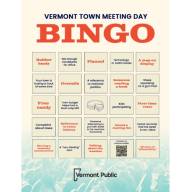Warren’s Short Term Rental ordinance becomes law tomorrow, October 17, but not without misgivings from a business owner, a former select board chair and others in Warren and The Valley with concerns that the ordinance does not go far enough.
The Warren Select Board heard some of those concerns this week at its October 14 meeting when the Pitcher Inn and The Warren Store owner George Dorsey asked the board to put more teeth in its STR ordinance. His comments were echoed by former Warren Select Board chair Bob Ackland who shared a letter with the board.
Ackland, former long-term chair of the Mad River Valley Planning District (MRVPD) steering committee, detailed how the planning district identified STRs as needing stronger fire, health, and safety standards.
Dorsey, said unregulated short-term rentals are undercutting lodging businesses in Warren and The Valley while also impacting community in some neighborhoods.
“Our restaurant doesn’t pay the bills,” Dorsey told the board. “You have to fill rooms. And over the last few months, that’s been almost impossible – except during peak foliage. We’ve had two or three weddings recently, and everyone stayed in a short-term rental.”
CONCERNS ARE CONSISTENT
Dorsey said he and other local hoteliers discussed the issue during a Mad River Valley Chamber of Commerce lodging committee meeting and that their concerns are consistent: short-term rentals are impacting quality of life and community, creating safety risks, and undermining businesses that follow regulations and invest in local infrastructure.
He shared a local example of Warren resident living on a street with eight houses, six or seven of which are short-term rentals. “You don’t really have a neighborhood,” he said.
From a safety perspective, Dorsey said traditional inns like his are heavily regulated by the state and fire marshal. “I have three fire escapes – one was added because the fire marshal insisted,” he said. “But I’m not sure a short-term rental would be required to have even one.”
Dorsey called on the board to include in the ordinance a basic certification requirement for short-term rental properties. “I’m not saying you need a team of inspectors,” he said. “If there’s a $200 certification fee and a simple punch list of safety and hygiene standards, owners will self-identify. It doesn’t need to be complicated.”
He said he supports the existence of short-term rentals. “I’m not trying to eliminate them. I just think they should be safe – and subject to the same standards as the rest of us. It’s about fairness.”
‘DEEPLY CONCERNED’
In his letter Ackland, said he was “deeply concerned” that the most recent draft of the STR ordinance omits the requirement for rentals to comply with fire and safety regulations applicable to commercial lodging.
“This omission is concerning, and I see no clear justification for removing this crucial safeguard,” Ackland wrote.
Ackland pointed to findings from a 2021 MRVPD white paper that identified three primary areas of concern with STRs:
- Health and Safety:
Insufficient enforcement of health and fire codes can pose risks to renters and neighbors. - Year-Round Housing Pressure:
The conversion of residential units to STRs reduces the housing supply, increasing costs and affecting local employment and school enrollment. - Community Disruption:
Neighborhoods saturated with STRs face increased traffic, noise, trash, and reduced property values, impacting long-term residents and community engagement.
Ackland said the original purpose of the STR ordinance was to ensure at least minimal compliance with health and safety standards while gathering data to understand broader impacts. “Given the importance of safety and community protection, I strongly urge the board to include a requirement that STR property owners provide certification confirming compliance with the Vermont Fire & Building Safety Code and the Vermont Rental Housing Health Code,” he wrote.
Ackland also questioned the effectiveness of relying solely on self-certification, noting that while platforms like Granicus (used by the town for compliance tracking) offer streamlined digital tools, they ultimately depend on owners being truthful.
“Owner certification relies solely on the honesty of the operator,” he warned. “It exposes both renters and neighbors to risk if the statement is untrue. An official inspection by the fire marshal, while more resource-intensive, offers much greater accountability.”
Devin Klein Corrigan, Warren Select Board chair, addressed the concerns during the hearing, and acknowledged the growing pressure the town is under to balance tourism, housing, and community well-being.
She noted that the ordinance had been amended largely to comply with guidance from the Vermont League of Cities and Towns, which advises that towns cannot impose stricter requirements on STRs than the state currently does. “We can’t restrict more than what the state allows,” Corrigan said.
Corrigan also said that the state fire marshal’s office declined to take on inspections, citing a lack of capacity. However, she added that the ordinance is a “living document” and that the town’s immediate focus is on building a registry of STRs to better understand the scope and impact of the issue.
“We want to support the fabric of our community,” Corrigan said. “The registry is the first step to collecting the data we need to inform future action.”
Dorsey urged the board not to wait. “You don’t have two years to figure this out,” he said. “If something doesn’t change in six to eight months, you’re going to see businesses start to close.”
Dorsey added that if tighter standards are implemented, many STR owners might shift toward long-term rentals or even sell, helping to restore housing stock and community life. “That creates neighborhoods again. People shop downtown; they join the community.”
Ackland, in his letter, said failing to enforce safety standards not only endangers the public but also puts traditional lodging operators – who are required to comply – at a disadvantage.
You might also like













